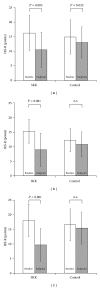Treatment of posttraumatic stress disorder using the traditional Japanese herbal medicine saikokeishikankyoto: a randomized, observer-blinded, controlled trial in survivors of the great East Japan earthquake and tsunami
- PMID: 24790634
- PMCID: PMC3982420
- DOI: 10.1155/2014/683293
Treatment of posttraumatic stress disorder using the traditional Japanese herbal medicine saikokeishikankyoto: a randomized, observer-blinded, controlled trial in survivors of the great East Japan earthquake and tsunami
Abstract
The Great East Japan earthquake and tsunami caused immense damage over a wide area of eastern Japan. Hence, many survivors are at high risk for posttraumatic stress disorder (PTSD). This randomized, observer-blinded, controlled trial examined the efficacy and safety of the traditional Japanese herbal formula saikokeishikankyoto (SKK) in the treatment of PTSD among survivors of this disaster. Forty-three participants with an Impact of Event Scale-Revised (IES-R) score ≥ 25 were randomized into SKK (n = 21) and control (n = 22) groups. The primary endpoint was the change in IES-R scores from baseline till after 2 weeks of treatment. Intergroup statistical comparisons were performed. The magnitude of changes in total IES-R scores differed significantly between the two groups (P < 0.001). Post hoc analysis showed that the total IES-R score improved significantly in the SKK group from 49.6 ± 11.9 to 25.5 ± 17.0 (P < 0.001). Subscale scores improved significantly in the SKK group (avoidance, P = 0.003; hyperarousal, P < 0.001; intrusion, P < 0.001). Two-week treatment with SKK significantly improved IES-R scores among PTSD patients. This traditional medicine may be a valid choice for the treatment of psychological and physical symptoms in PTSD patients.
Figures


References
-
- Takeda T, Tadakawa M, Koga S, et al. Premenstrual symptoms and posttraumatic stress disorder in Japanese high school students 9 months after the Great East Japan Earthquake. The Tohoku Journal of Experimental Medicine. 2013;230(3):151–154. - PubMed
-
- Iwasaki K, Satoh-Nakagawa T, Maruyama M, et al. A randomized, observer-blind, controlled trial of the traditional Chinese medicine Yi-Gan San for improvement of behavioral and psychological symptoms and activities of daily living in dementia patients. Journal of Clinical Psychiatry. 2005;66(2):248–252. - PubMed
-
- Neylan TC, Marmar CR, Metzler TJ, et al. Sleep disturbances in the Vietnam generation: findings from a nationally representative sample of male Vietnam Veterans. American Journal of Psychiatry. 1998;155(7):929–933. - PubMed
LinkOut - more resources
Full Text Sources
Other Literature Sources

